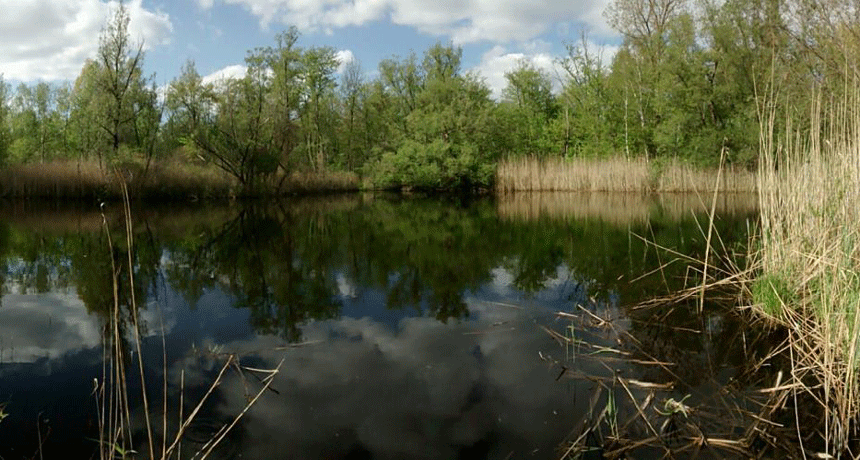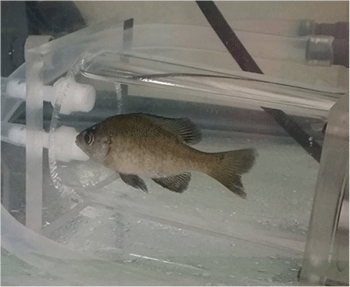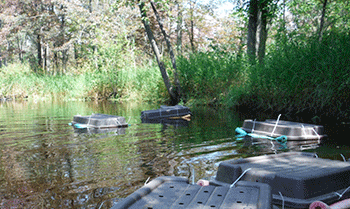Fish get pooped living in polluted water
Pollutants flushed down toilets — and into the environment — tire fish, which could make finding food and avoiding predators harder

This pretty Canadian stream hides a dirty secret: It is downstream of a water-treatment plant that releases low levels of pollutants. Researchers caged fish here to test how pollution affects their vitality.
McMaster University
Dirty water can leave a fish pooped. Living downstream from a waste-treatment plant made fish work at least 30 percent harder to survive, a new study finds.
Graham Scott is a biologist in Canada at McMaster University in Hamilton, Ontario. He led the new study. “Wastewater treatment plants are pretty good at taking stuff we put into water and treating it before it gets into our waterways,” he notes. “But not everything we flush down the toilet or down our drains gets taken out.”
For example, these plants were not designed to remove remnants of drugs. So when people pee out compounds left over after their bodies use and then break down medicines, those drugs can be released into the environment. These include the hormones in birth-control pills, the drugs used to treat depression and medicines to lower blood pressure.

Life-sustaining chemical reactions in an animal’s body (including ours) allow it to grow, move and reproduce. These reactions, taken together, are known as the creature’s metabolism. It takes a lot of energy to power these processes. Some studies have shown that even traces of just one drug can change an aquatic animal’s metabolism. It can make their bodies work harder, even when they are supposedly at rest.
“That’s energy they burn just to stay alive,” explains Scott. That also is energy no longer available to avoid predators, to find food and to mate. Instead, the animals use that extra energy to rid their bodies of the pollutants. Such chemicals can damage their cells and tissues or reprogram how their bodies respond to the environment. So their bodies work to break down those contaminants. Then they pee the remains out.
If fish respond this way when they are exposed to just one drug, what would they do when their water held a mix of them? Scott’s team wanted to know. After all, water downstream from treatment plants tends to host low levels of many such compounds.
In fact, they now report, fish exposed to such a mix can use up to a third of their energy just to deal with those pollutants. Scott’s team shared its new findings January 18 in Environmental Science & Technology.
First they trapped fish
The researchers captured bluegills in unpolluted waters near Lake Ontario. Then they divided these fish into three groups. They caged some of them 50 meters (164 feet) downstream from a nearby water-treatment plant. They caged another group in waters 830 meters (a half mile) downstream of the plant. The last fish were caged in unpolluted local water, well away from the treatment plant.

All of these fish remained caged for three weeks during the summer. Afterward, the researchers brought the fish into their lab to measure their metabolism.
They did this by putting the fish into small clear tanks of water. Each tank held a wire probe. It was attached to an oxygen sensor. The tank’s sensor measured how fast a fish had removed oxygen from the water. Oxygen is an essential ingredient for a fish’s metabolism. So the faster a fish uses oxygen, the more energy it is burning to carry out its bodily processes.
Those that had been caged closest to the treatment plant now used the most energy. They burned 36 percent (one third) more oxygen than fish in clean water. Even fish well downstream from the plant used 30 percent more oxygen than normal.
How big a deal is that? Explains Scott: “A 30 to 36 percent increase in metabolism is probably like us going for a half-hour to an hour run.” And their bodies may have been using oxygen at that rate 24/7 in the wild.
It’s not known if all fish species would react the same way. Scott’s previous research suggests an invasive species called a round goby is different. It seemed to need less energy to rid its body of pollutants.
But for species that do respond by using lots more energy, pollution could harm them, says Paul Craig. He is a biologist at the University of Waterloo in Ontario. Less energy available to eat and avoid being eaten could well reduce their survival. And extra energy spent coping with contaminants means less energy available to find a mate or produce eggs.
“It is up to us to help reduce the types of pollutants that are found in wastewater,” Craig says. That includes, he says, “not flushing leftover medication down the toilet.” He also recommends using less polluting soaps and detergents.







